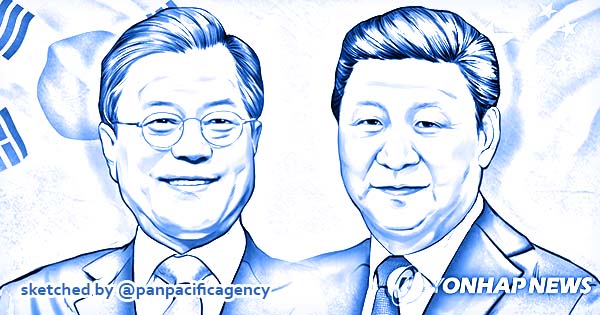China to host top-level talks with S. Korea as US presses containment strategy in region

This image shows South Korean President Moon Jae-in (L) and Chinese President Xi Jinping. (Yonhap). Sketched by the Pan Pacific Agency.
BEIJING, Mar 31, 2021, SCMP. Chinese Foreign Minister Wang Yi will host his counterpart from Seoul, Chung Eui-yong, for talks this week as China tries to woo South Korea and break US containment in the region, South China Morning Post reported.
Chung, who became South Korea’s minister of foreign affairs in February, will meet Wang in the southeastern Chinese province of Fujian this week, sources told the South China Morning Post.
The visit to China by South Korea’s top diplomat will come just weeks after a tour of Asia by United States Secretary of State Antony Blinken and Defence Secretary Lloyd Austin in which Blinken and Austin focused on marshalling Washington’s alliances, in particular with Tokyo and Seoul, to counter Beijing’s clout in the region.
Seoul has sought to find balance in its alliance with Washington and its economic reliance on China, with Chung saying after Blinken’s visit that South Korea valued its relations with both powers and did not want to pick a side.
Previously a top security adviser to South Korean President Moon Jae-in, Chung played a key role in Moon’s engagement policy for North Korea that led to the historic summit between former US president Donald Trump and North Korean leader Kim Jong-un in 2018. Chung also served as Moon’s special envoy in liaising with China on North Korea.
In a phone call in February soon after Chung took office, Wang called for stronger communication and cooperation between the two countries “amid the fast-changing international and regional situation”, including regarding the denuclearisation of the Korean peninsula. Wang also said China “opposes drawing lines according to ideology”, a reference to US attempts to isolate China internationally.
In trade issues, South Korea could potentially also be the weak link in Washington’s attempts to block China’s access to advanced chips for the country’s industrial and technological upgrade.
On Monday, South Korean chip maker Magnachip Semiconductor said it would be sold to a Chinese private equity fund for about US$1.4 billion. The company is a leader in organic light-emitting diode (OLED) display semiconductors. The deal, which some say could threaten South Korea’s lead in the OLED industry, is likely to require government approval.
“The US wants to create a network of encirclement with Japan and South Korea, as well as the ‘Quad’, against China. But South Korea has not participated in this effort,” said Lu Chao, a Korean affairs expert at the Liaoning Academy of Social Sciences.
“China and South Korea share our mutual wariness towards Japan’s history of militarism. South Korea also needs China’s help in maintaining stability on the Korean peninsula.”
Seoul has sought to distance itself from the US campaign and avoid antagonising China, its biggest trading partner. It sidestepped direct mention of China in its 2+2 joint statement with the US during Blinken’s stop in Seoul. This was in contrast to the US-Japan joint statement which featured much tougher wording and direct criticism of China’s behaviour in the region.
Chung also insisted after his meeting with Blinken there was no discussion of South Korea joining the Quadrilateral Security Dialogue, Quad – a US-led grouping involving Japan, Australia and India with the goal of countering China’s influence in the region – despite previous reports that Washington had invited Seoul to join.
In 2017, South Korea paid a steep economic price for angering China after it deployed the US Terminal High Attitude Area Defence (THAAD) anti-missile system. Beijing says THAAD could be used by the US to spy on China.
The Chinese backlash and retaliation measures cost South Korea’s economy an estimated US$7.5 billion and the episode still casts a shadow over relations between the two countries.
Park Won-gon, a professor of North Korean studies at Ewha Womans University, said Chung was likely to use his trip to seek China’s support to resume nuclear talks with North Korea. The two foreign ministers were also expected to discuss Chinese President Xi Jinping’s possible visit to South Korea, an opportunity Seoul hoped would mark a fresh start in bilateral relations after the THAAD dispute.
But as the US intensified its efforts to further isolate China in the region, Park said South Korea would find it more difficult to maintain a balance between the two powers.
“South Korea’s so-called strategic ambiguity is at the end of [its] life. Sooner or later, the US government will formalise the Quad-type multilateral mechanism and request South Korea to join. South Korea [would have] no choice but to participate.”